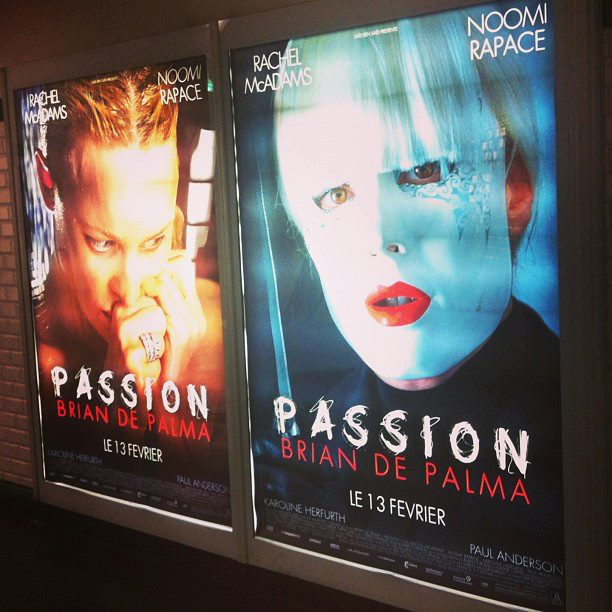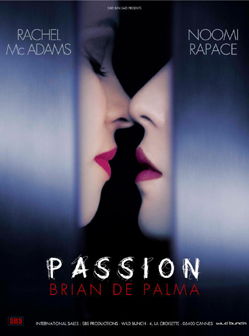'SIDE EFFECTS' MAY INCLUDE HITCHCOCK, DE PALMA
ALTHOUGH CREATORS CITE LYNE & KASDAN FILMS AS INITIAL SPARKS Steven Soderbergh
Steven Soderbergh's
Side Effects opened yesterday. Reviews have been coming in all week long that call the film
Hitchcockian, and in some cases,
Brian De Palma's name has been mentioned, as well. While at least a couple of the reviews and articles mention De Palma's
Body Double, [
possible spoiler here] there is one key scene that reminded me of a key scene in De Palma's
Sisters. [
End of spoilers] In any case, the less you know about the movie going in, the more you will enjoy it.
Indiewire's Drew Taylor this week posted "10 Psychosexual Thrillers To Get You Ready For Steven Soderbergh's
Side Effects," and included
Body Double, along with
Adrian Lyne's
Fatal Attraction (which he notes was Soderbergh's "principle inspiration" for
Side Effects),
Lawrence Kasdan's
Body Heat (which Taylor notes was one of screenwriter
Scott Z. Burns' "chief inspirations" for
Side Effects),
Alfred Hitchcock's
Psycho,
Paul Verhoeven's
Basic Instinct,
Pedro Almodovar's
The Skin I Live In (with which Taylor notes that Almodovar "was able to synthesize" the styles of Hitchcock and De Palma), the
Wachowski Brothers'
Bound,
David Cronenberg's
Dead Ringers,
David Fincher's
The Girl With The Dragon Tattoo (which, like
Side Effects, stars
Rooney Mara), and
Richard Marquand's
Jagged Edge. Here's what Taylor wrote about
Body Double:
--------------------------------"If there's a king of the psychosexual genre, then Brian De Palma should probably be the one to wear the crown. Beginning with his debut feature,
Murder A La Mod (1968) and continuing through to
Passion (which will be released later this year), De Palma has been working over themes of obsession, violence, and betrayal, in particular during a string of profitable and highly controversial movies in the '70s and '80s. (Detailed lovingly in the recent, pseudo-academic book
Un-American Psycho by
Chris Dumas.) While
Dressed to Kill might be the most psychosexual of his psychosexual heyday, there's something sleazier and steamier about
Body Double, his unheralded classic from the period, that was unjustifiably thrown under the bus for perceived misogynistic undertones and what critics viewed as too many lapses in logic in De Palma's dreamlike narrative. (He's admitted some things in the movie just don't work.) But it's for all these reasons, not in spite of them, that
Body Double is such a whacked-out delight. Like
Dressed to Kill, which liberally cribs from
Psycho,
Body Double finds De Palma riffing on Hitchcock, in this case
Rear Window, with a struggling actor (
Craig Wasson) agreeing to housesit for a friend. After her watches a woman get killed (in a sequence that caused the public outcry – she gets speared by a giant phallic drill), he's drawn into the underground world of Los Angeles pornography. (It was originally intended as a micro-budget film with an NC-17 rating.)" [Editor's note: the NC-17 rating did not exist at the time
Body Double was released; De Palma had originally talked about making a film that would receive a pure, unadulterated X rating.] "
Body Double is goofier than
Blow Out, De Palma's masterpiece, but it's still a sparkly crown jewel for the king of the psychosexual thriller.
-------------------------------------Here are some of the reviews with quotes:
Randall King, Winnipeg Free Press
"Soderbergh, working from a script by Scott Z. Burns, delivers a genre mash-up, a murder mystery that strives to address the social ills that attend prescription pharmaceuticals. This has the capacity to be a hot-button movie playing on the all-too-pertinent link between violence and prescription meds. But Soderbergh seems to be gingerly avoiding head-on confrontation. Instead, he bottles a more mundane thriller of the type that might have appealed to Brian De Palma a decade or two earlier."
Jeff Myers, Metro Times
"From Soderbergh’s head-scratching opening homage to Roman Polanski’s Rosemary’s Baby to a plot that, at first, seems to be a cautionary legal tale of big pharma abuses, Side Effects unexpectedly develops into a postmodern Hitchcockian thriller —which is actually akin to one of Brian De Palma’s chilly psychological puzzles. That’s an awful lot of cinematic referencing for one movie. But let me put a cherry on top, won’t you? With its eventual double-cross plot turns, paranoid wrong-man drama, and corrupt corporate subtext, Side Effects plays like a particularly nasty episode of Law and Order: Criminal Intent had it been directed by Robert Altman."
Josh Board, Fox 5 San Diego
"Now, this is about all I will tell you regarding the plot. Even the trailers, and the stars of the movie on talk shows, have given away too much. I went in knowing nothing about it when I saw it last month. And I loved the way it went from a bit of an ethical dilemma to a psychological thriller. It was Hitchcock-light. More like Brian De Palma."
Al Alexander, The Patriot Ledger
"To even begin to describe the plot would be a disservice to anyone who has not yet basked in the film’s psychotic pleasures. Just know that nothing – and I mean, nothing – is what it seems, right up to the superbly composed final shots that come courtesy of Soderbergh, who serves as both editor and cinematographer (under the pseudonym of Peter Andrews) as well as director. It’s easily his finest – and most commercial – effort since Oceans 13. It’s also like nothing he’s ever done before, as he boldly treads into the domain normally reserved for masters of suspense like Hitchcock (think Vertigo) and Brian De Palma (Body Double, anyone?)."
Kurt Loder, Reason.com
"Steven Soderbergh’s Side Effects is a grippingly 'Hitchcockian' movie, but not in the manner of, say, Brian De Palma, who blithely appropriated the master’s narrative elements and visual techniques for ’80s films like Dressed to Kill and Body Double. Soderbergh’s picture is something else, a bracingly lurid tale of a man trapped in a thickening web of circumstance—the sort of story that Hitchcock might well have wanted to tell himself. In the late director’s absence, Soderbergh, who over the course of 24 years has demonstrated a rare facility in a wide array of genres, proves to be just the man for the job."
Brian Tallerico, Hollywood Chicago
"Side Effects not only draws on Soderbergh’s career but has conscious echoes of Roman Polanski, Brian De Palma, and Alfred Hitchcock as well...
"That first act has echoes of Polanski’s wonderful, urban paranoia films like Repulsion as Soderbergh (under the pseudonym of Peter Andrews) shoots the 'wounded bird' of Mara often from below or above, heightening the claustrophobia of a city in which millions can feel alone despite being in such close proximity. Then the film twists and Soderbergh/Andrews & Burns bring a different, pulpier style that’s more reminiscent of De Palma when he so blatantly mimicked Hitchcock. Technically, it’s a marvelous piece of work as Soderbergh proves defter with his camera with every film."
Kate Erbland, Film School Rejects
"Yet, Side Effects seems more intent on toying with its viewers’ expectations than in really crafting its own internal cat-and-mouse game. The actual meat of its full storyline is unexpectedly trashy and tawdry, like some unholy mix of Brian De Palma film and Lifetime Original movie."
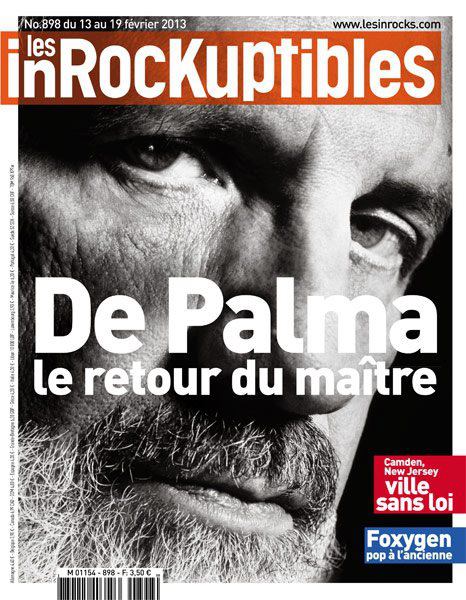 Jean-Marc Lalanne's online review of Passion at LesinRocks contains some spoilers, but in it, he calls the split-screen sequence in the film "the most extravagant and poetic De Palma has ever designed."
Jean-Marc Lalanne's online review of Passion at LesinRocks contains some spoilers, but in it, he calls the split-screen sequence in the film "the most extravagant and poetic De Palma has ever designed."



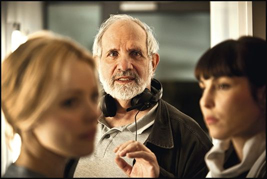 This past Friday, Samuel Blumenfeld, who has been interviewing Brian De Palma consistently for a number of years (mostly for the book, Brian De Palma: Conversations with Samuel Blumenfeld and Laurent Vachaud), posted an article about De Palma and Passion for
This past Friday, Samuel Blumenfeld, who has been interviewing Brian De Palma consistently for a number of years (mostly for the book, Brian De Palma: Conversations with Samuel Blumenfeld and Laurent Vachaud), posted an article about De Palma and Passion for 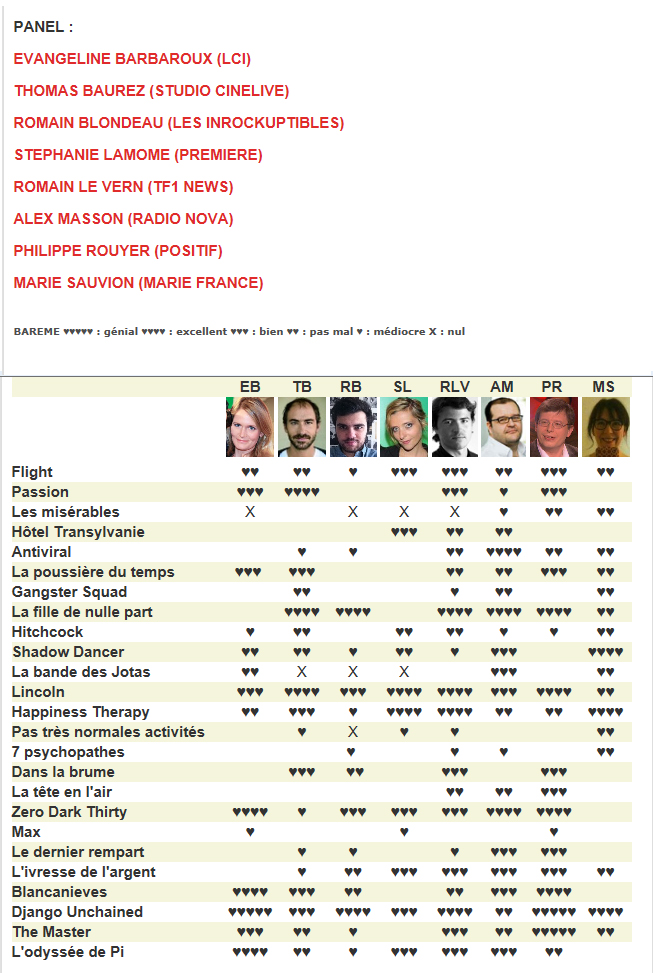
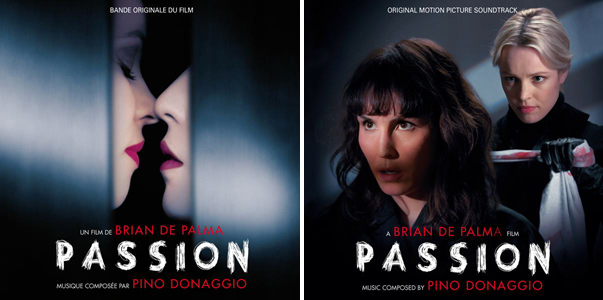
 Steven Soderbergh's Side Effects opened yesterday. Reviews have been coming in all week long that call the film Hitchcockian, and in some cases, Brian De Palma's name has been mentioned, as well. While at least a couple of the reviews and articles mention De Palma's Body Double, [possible spoiler here] there is one key scene that reminded me of a key scene in De Palma's Sisters. [End of spoilers] In any case, the less you know about the movie going in, the more you will enjoy it.
Steven Soderbergh's Side Effects opened yesterday. Reviews have been coming in all week long that call the film Hitchcockian, and in some cases, Brian De Palma's name has been mentioned, as well. While at least a couple of the reviews and articles mention De Palma's Body Double, [possible spoiler here] there is one key scene that reminded me of a key scene in De Palma's Sisters. [End of spoilers] In any case, the less you know about the movie going in, the more you will enjoy it.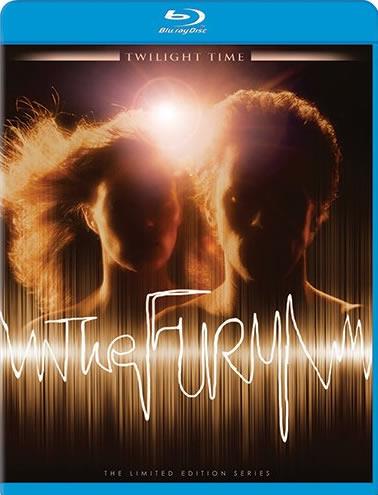 Back in Decmber, it was announced that
Back in Decmber, it was announced that 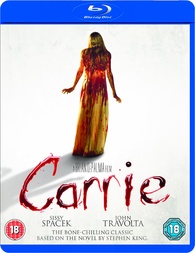 Meanwhile, in the U.K., MGM had timed a Blu-ray release of De Palma's
Meanwhile, in the U.K., MGM had timed a Blu-ray release of De Palma's 